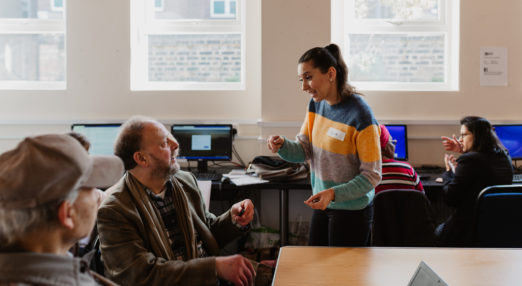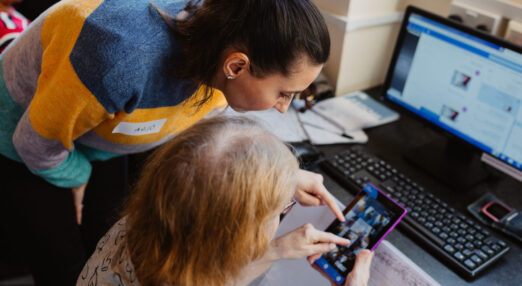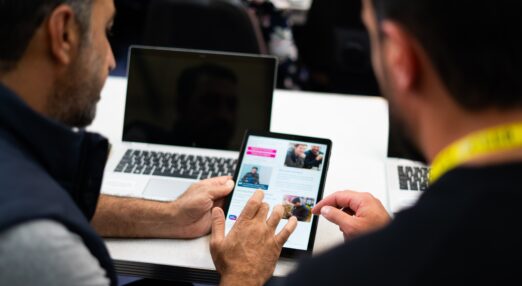Why we must work together so that everyone can get online
As Get Online Week comes to an end for another year, we reflect on the big question: how are we going to fix the digital divide? The answer lies in the power of partnerships with community, corporate and Government, writes Natasha Bright-Wray - we know we are better together and can’t do it alone.
We have partnerships with thousands of organisations who are advocates for digital inclusion. Together we work as a group with a shared mission, knowing we can have a greater impact on fixing the digital divide than if we were all acting alone.
At the heart of these partnerships is the National Digital Inclusion Network – our community partners with a shared vision – all working together, delivering a range of digital inclusion services like the National Databank. The variety of Get Online Week events has been a fantastic example of the way that members of the Network tailor their support in a way that works for their local communities.
Supporting diverse communities through local partnerships
The organisations within the National Digital Inclusion Network are as diverse as the communities they support. Digital inclusion support is delivered from fish and chip shops, libraries, co-working spaces, churches, you name it. These are trusted community spaces, places where people can go if they need help with something.
We’re proud to work with these community organisations – supporting them with our digital inclusion services, learning opportunities and grant funding (like our Fix the Digital Divide fund); as well as to host events during campaigns such as this week’s Get Online Week – with the hope of raising awareness of their services and reaching more digitally excluded people. And like all good partnerships we collaborate with advisory groups that shape our services, and spokespeople from the Network help us to raise the profile of digital exclusion on a national scale.
Hafsha Sheikh, SmartLyte in Birmingham, said: “The support we receive as members of the network is fantastic. We can now provide people with solutions that we couldn’t offer before. The team at Good Things Foundation are very professional and knowledgeable and make a real effort to understand what we do. Most importantly, they have become our friends.”
Corporate partners enabling us to do what we do
But our work with the National Digital Inclusion Network is only made possible thanks to our strategic partnerships with Virgin Media O2, Vodafone and Nominet.
Our strategic partners help us catalyse change, impacting digital exclusion at a large scale. Speaking to Raconteur, Simon Feldman from Virgin Media O2 said: “When selecting a charity partner, we think about the potential impact we can have on society and people’s lives. Our three-year strategic partnership with Good Things Foundation epitomises all of this and more.
“When tackling a complex social issue like digital exclusion, finding a partner that was already embedded in a community was essential for success, so Good Things Foundation and their network were uniquely placed in this way.
“As a result, our partnership with Good Things Foundation is enabling us to offer targeted help and support directly to people in communities by offering free data via the National Databank (which is like a foodbank but for free mobile data, texts and calls) and digital skills to people who need them across the UK.”
We’re grateful that our partners can provide strategic advice and insight, bringing the best of each organisation to help solve key challenges in digital inclusion and support us in achieving our ambition.
That said, the digital divide is deepening, and we need Government action to tackle digital exclusion.
The need for Government support at all levels
Only weeks ago at political party conferences, each party outlined their plans to make the United Kingdom a digital powerhouse – with AI specialists to rival those of China and America, but with safety measures in place to protect the vulnerable.
In smaller rooms, at fringe events, those who have been left behind were discussed – the digitally excluded people, 10.2 million of which reside across the country, lacking those basic digital skills to do activities like set up an email address.
But now, the Government has shown that they lack ambition to fix the digital divide. In their 20th October response to the House of Lords digital exclusion inquiry, they acknowledged that millions of people are affected by this issue. However the Government showed no plans to refresh its decade-old digital inclusion strategy, and showed little desire to engage with recommended solutions. Their response fell flat, and we were disappointed to see a lack of action.
We must work together to fix the digital divide – for good
We’re already doing so much to fix the digital divide, along with our partners – from our strategic partnerships with Virgin Media O2, Vodafone and Nominet through to our community partners in the National Digital Inclusion Network. But with Government support, we could do so much more, and together, our work could be turbo-boosted.
We can’t fix the digital divide alone. Find out how you can get involved and help more people get online.
Read more Good Things
-

Digital Inclusion: Time for Action Not Words
The House of Lord's digital exclusion inquiry rang alarm bells - but the Government's response fell flat. Our Group CEO, Helen Milner OBE, writes about our disappointment at...
-

Think everyone is online? Think again.
Alison Lawley, Digital Communications & Campaigns Manager, kicks off our annual digital inclusion campaign Get Online Week with a cold hard truth: millions of people still can’t access...
-

New research reveals 38% of Brits face challenges because of a lack of digital skills
Research commissioned by Virgin Media O2 highlights highlights the digital skills challenges faced by the UK population and the reality of digital exclusion.
